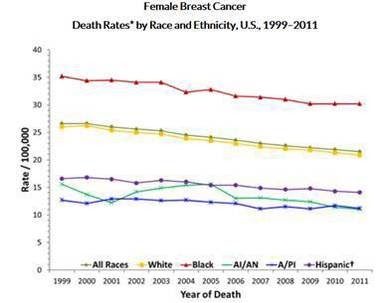
Health Matters for Women
Improve Black Women's Health
During African American (Black) History Month, we highlight opportunities to address issues that impact the health of black women in our communities.
Improve Breast Cancer Diagnosis and Treatment

Black women have the highest breast cancer death rates of allracial and ethnic groups and are 40% more likely to die of breast cancer than white women. The reasons for this difference include having more aggressive cancers and fewer social and economic resources.
To improve this disparity, black women need more timely follow-up and improved access to high-quality treatment.
What can we do to improve breast cancer diagnosis and treatment?
- Advise women that the Affordable Care Act provides specific benefits and coverage for women, including coverage of mammograms without co-pays in many health plans.
- Use the National Breast and Cervical Cancer Early Detection Program to help uninsured women get screening and access to treatment.
- Understand factors that contribute to health disparitiesin cancer and identify opportunities to reduce health disparities.
- Engage well-trained case managers, health educators, community health workers, and other patient navigators to help women understand and guide them through the health care system.
- Use evidence-based tools like electronic systems or other reminders to notify patients when it’s time to get a mammogram.
- Learn from others about screening successes and from a cancer screening program in South Carolina.
Overview
All women are at risk forbreast cancer. Getting screened regularly can lower the risk of dying from breast cancer. Women between 50 and 74 years old should get a mammogram every two years. Those under 50 should talk with their provider about when they should be screened.
Related Healthy People 2020 Objectives
C-3 Reduce the female breast cancer death rate.
C-11 Reduce late-stage female breast cancer.
C-13 Increase the proportion of cancer survivors who are living 5 years or longer after diagnosis.
C-17 Increase the proportion of women who receive a breast cancer screening based on the most recent guidelines.
C-18 Increase the proportion of adults who were counseled about cancer screening consistent with current guidelines.
AHS-1 Increase the proportion of persons with health insurance.
AHS-6 Reduce the proportion of persons who are unable to obtain or delay in obtaining necessary medical care, dental care, or prescription medicines.
More Information
CDC Podcasts
Listen to the latest podcasts on women’s health.
Listen to the latest podcasts on women’s health.
CDC E-Cards
Send women’s health e-cards.
Send women’s health e-cards.






















.png)











No hay comentarios:
Publicar un comentario